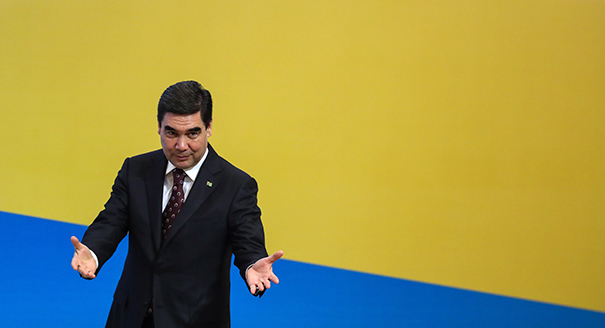Turkmenistan has long ranked among the least free and least democratic countries in the world. Despite regularly holding presidential and parliamentary elections, the country has no opposition to President Gurbanguly Berdymukhamedov’s Democratic Party of Turkmenistan, and elections remain a mere formality: in the most recent presidential election, held on February 12, Berdymukhamedov won 97.7 percent of the vote.
Initially, Berdymukhamedov seemed to be relatively liberal compared to his predecessor, Saparmurad Niyazov, who bestowed upon himself the title “President for Life.” But despite scrapping some of Niyazov’s most oppressive laws, Berdymukhamedov, who goes by the title Arkadag (the Protector), has proven himself to be a full-fledged dictator since becoming president in 2007.
Though he hasn’t made himself president for life yet, Berdymukhamedov seems poised to stay in power indefinitely: anticipating economic problems in the coming years, Arkadag decided to buy himself some time by having parliament adopt a new constitution in September 2016 that extended his next term in office from five to seven years. Berdymukhamedov will thus remain in power until at least 2024.
But the depressed hydrocarbon prices and gas dispute with Russia that have plagued Turkmenistan’s economy for the last several years will likely keep Arkadag from bringing back the luster and prosperity of Ashgabat’s golden age.
Under Niyazov, Turkmenistan received enormous dividends from its seemingly infinite oil and gas deposits: the world’s fourth-largest natural gas reserves afforded Turkmenistan the opportunity to spend money on golden statues of Niyazov and luxury palaces in Ashgabat, and to invest money in industrial development. In 1993, Niyazov introduced utility benefits for all Turkmen citizens: everyone received free electricity, water, and gas for heating, and people were able to buy gas for their vehicles at a fraction of the real cost (a liter of gasoline cost just 2 cents at the time, less than a bottle of water).
Though these benefits grew during the first years of Berdymukhamedov’s rule, they began to dry up in 2013–2014 as global hydrocarbon prices fell. By the end of last year, news from Turkmenistan started to resemble news from North Korea: there are now shortages of everything imaginable. Sugar, eggs, butter, and chicken have become scarce commodities, and huge lines form outside stores as soon as they come into stock. In Ashgabat, stores sell cigarettes for only an hour a day, and women can’t buy cigarettes unless they can produce a doctor’s note saying they are dependent on tobacco.
This state of affairs bears little resemblance to the “Era of Might and Happiness” that state media proclaimed Berdymukhamedov’s reelection in 2012 would usher in.
The loss of the Russian gas market after a protracted dispute with the gas giant Gazprom is making Turkmenistan’s economic situation even worse. The dispute started after a 2009 accident at a Turkmen pipeline, continued with arbitration hearings in Stockholm over fuel prices and Russian debt to Turkmenistan, and ended with Gazprom announcing a two-year moratorium on purchasing Turkmen gas.
Gas shipments account for up to 90 percent of Turkmenistan’s total exports. Though exports were up 6 percent in 2016, with most of Turkmenistan’s gas sold to China under a long-term contract, Ashgabat experienced serious currency shortages in early 2016 because Turkmenistan receives only one-third of the sale amount in hard currency; the rest of the money goes toward repaying loans that Berdymukhamedov has taken out.
Currency shortages have indeed become a significant problem in Ashgabat. Back in 2015, Turkmenistan’s Central Bank stopped selling foreign currency to domestic companies; shortly thereafter, foreign currency disappeared from exchange offices and is presently sold on the black market at twice the official rate.
Problems also plague Turkmenistan’s currency, the manat. The government deposits pensions, student allowances, public-sector salaries, and other payments on ATM cards, which aren’t widely accepted outside of Ashgabat. Most ATMs are out of order, and long lines form outside machines that do work as soon as cash becomes available.
Until recently, Iran had purchased Turkmen fuel to supply energy to its northeastern regions. But with $1.8 billion in arrears for the 2007–2008 gas shipments, Tehran is also a problematic partner. It’s been reported that the parties may finally come to an agreement on the issue of debt; otherwise, China will become the sole buyer of Turkmen gas.
Meanwhile, Turkmenistan lacks the funding to fulfill its obligations to the TAPI (Turkmenistan-Afghanistan-Pakistan-India) pipeline project. The start of construction was postponed from 2019 to 2020 in part due to Afghanistan’s security concerns, but also because the Turkmen government doesn’t have enough money to finance the pipeline: Turkmenistan is responsible for 85 percent of the project’s $10 billion price tag, and it’s not entirely clear how Arkadag is going to come up with the money.
It’s possible that Turkmenistan will be able to get Gazprom involved in the project to secure the much-needed financing. In the past six months, the Turkmen president has initiated meetings with the head of Gazprom and the Russian president—a very rare move on his part. While no information about the meetings has been disclosed, it’s possible that Gazprom has expressed interest in joining the TAPI project in exchange for gaining control over Turkmen pipelines (Gazprom took over Kyrgyz pipelines in a similar move).
Indeed, with major economic challenges on the horizon, it’s easy to see why Arkadag chose to extend his next term in office from five to seven years.
